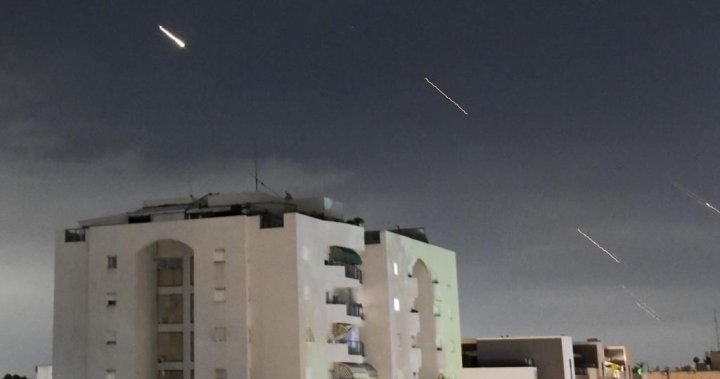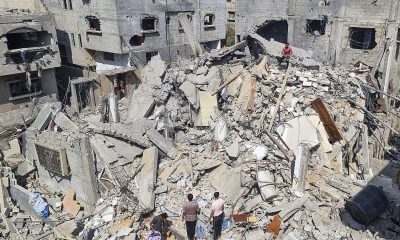General News
How Israel’s Iron Dome works as officials say it blocked 99% of Iran strikes – National

After decades of enmity and proxy conflict, Iran directly attacked Israel for the first time on Saturday.
A top Israeli military official said Iran fired 170 drones, more than 120 ballistic missiles, and over 30 cruise missiles at Israel, and that 99 per cent were intercepted.
A seven-year-old girl was reported severely injured by shrapnel from a missile that severely injured her, not the missile itself. The strikes followed a suspected Israeli airstrike on the Iranian embassy in Syria earlier this month that killed multiple Iranian military leaders.
The militaries of the United States and the United Kingdom helped shoot down Iran’s swarm of projectiles and drones, but so did Israel’s own missile defence systems known as the “Iron Dome.”
So how does it work?
Israel’s Iron Dome is a short-range missile defence system that targets drones, mortars and rockets between four and 70 kilometres away with a 90 per cent success rate, according to the Israeli government.
Israel’s Iron Dome anti-missile system fires to intercept a rocket launched from the Gaza Strip towards Israel, near Sderot, Israel, Thursday, May 11, 2023.
Ohad Zwigenberg / AP Photo
An Israeli state-owned firm designed it to protect the country’s population from the kinds of attacks the terrorist groups Hamas typically and sporadically launched at the country before Oct. 7, 2023, and it has done so thousands of times since it was first deployed in 2011.
The system quickly determines if an incoming rocket is on course to hit a populated area.
Breaking news from Canada and around the world
sent to your email, as it happens.
If it is, Iron Dome launches its own missile to intercept it.
If not, the system ignores the rocket, which will land harmlessly.
What about longer range attacks?
In the case of medium and longer range attacks, Israel uses similar systems.
David’s Sling is a medium-range missile defence system that targets drones, aircraft and ballistic missiles, which Iranian proxy Hezbollah possesses, 100 to 200 kilometres away.
Israeli Air Defense Systems are seen during a ceremony inaugurating a joint U.S.-Israeli missile interceptor at the Hatzor Air Base, Israel, on April 2, 2017. David’s Sling, meant to counter medium-range missiles possessed by Iranian-backed Hezbollah militants in Lebanon, officially became operational at the ceremony, the military said.
Sebastian Scheiner / AP Photo
The Arrow-2 and Arrow-3 systems are also long-range missile defence systems that operate outside of the Earth’s atmosphere, operating at an altitude that allows for the safe dispersal of any missiles carrying nuclear, chemical or biological warheads.
Israeli developers designed it with Iranian missiles in mind.
Then U.S. national security adviser Susan Rice, front, addresses the media in front of an Arrow II ballistic missile interceptor during her visit to Palmachim Israeli Air Force base near the city of Tel Aviv on May 9, 2014.
Tsafrir Abayov / AP Photo
The Israeli government announced it used the Arrow defence system on Oct. 31, 2023, the first time since the Oct. 7 attacks to intercept a surface-to-surface missile over the Red Sea that Houthi militants had launched at the country.
As well, Israel is developing a laser system to intercept incoming threats.
Israel’s missile systems cost between tens of thousands and millions of dollars to defend the country against rockets, missiles and drones.
The laser system is projected to cost less than three dollars per interception, though it is not yet operational.
World leaders are urging Israel not to retaliate out of concern it could ignite a wider regional conflict against Iran and its proxies.
White House national security spokesman John Kirby told NBC that President Joe Biden does not want an escalation in the regional conflict or a “wider war” with Iran, and is “working on the diplomatic side of this personally.”
British Prime Minister Rishi Sunak said “all sides must show restraint” to avoid a rising spiral of violence in the Middle East and French President Emmanuel Macron said Paris will try to “convince Israel that we must not respond by escalating.”
“We have condemned, we have intervened, we will do everything to avoid an escalation, an inferno,” Macron told French media BFMTV and RMC on Monday.
Instead of retaliating by attacking Tehran, France will work to “isolate Iran, increase sanctions and find a path to peace in the region,” Macron said.
Even Russia has expressed concern over a wider fight.
“Further escalation is in no one’s interests. Therefore, of course, we advocate that all disagreements be resolved exclusively by political and diplomatic methods,” Kremlin spokesperson Dmitry Peskov said.
Iran’s foreign minister posted on X, formerly Twitter, that Iran has no intention of continuing attacks on Israel, but Iran “will not hesitate to protect its legitimate interests against any new aggression.”
— with files from The Associated Press and Reuters
© 2024 Global News, a division of Corus Entertainment Inc.
Source
Disclaimer: No copyright infringement intended. All rights and credits reserved to respective owner(s).

























